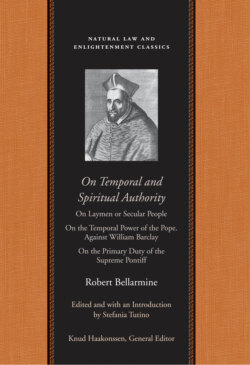Читать книгу On Temporal and Spiritual Authority - Robert Bellarmine - Страница 26
На сайте Литреса книга снята с продажи.
CHAPTER 12 The third proposition
ОглавлениеThe conduct of public trials is not forbidden to Christians. The proof is, first, that it is a prerogative of the prince to exercise justice, for Scripture usually considers king and judge almost as synonyms: Psalm 2, “Be wise now therefore, O ye kings: be instructed, ye judges of the earth”;102 Isaiah 33, “For the Lord is our judge, the Lord is our lawgiver, the Lord is our king”;103 Jeremiah 23, “A King shall reign and prosper, and shall execute judgment and justice in the earth.”104 If, therefore, it is lawful for Christians to have a prince, why not a judge also?
Second, because the laws would have no benefit if there were no judgment, but laws must not be abolished, as we showed above, nor therefore judgments.
Third, Scripture in both Testaments admits judgments, for we read this in Deuteronomy 16: “Judges and officers shalt thou make thee in all thy gates, which the Lord thy God giveth thee, throughout thy tribes: and they shall judge the people with just judgment”;105 1 Corinthians 6: “If then ye have judgments of things pertaining to this life, set them to judge who are least esteemed in the church. I speak to your shame. Is it so, that there is not a wise man among you? no, not one that shall be able to judge between his brethren?”106 There the apostle admonishes the Corinthians to appoint judges among themselves in those cases where they did not necessarily have to go to the tribunals of the pagans.
The arguments that were posed in the beginning are not difficult to disprove. To those words of Matthew 5, “And if any man will sue thee at the law, and take away thy coat, let him have thy cloak also,”107 I reply with St. Augustine in his epistle 5 [138] to Marcellinus that this phrase must be understood to concern only the readiness of the spirit, for in the same place our Lord says: “Whosoever shall smite thee on thy right cheek, turn to him the other also.”108 Nevertheless our Lord Himself when smitten on the cheek did not turn the other, but said in John 18, “Why smitest thou me?”109 by which example He taught how His precepts should be understood.
To the words of the apostle in 1 Corinthians 6, “There is utterly a fault among you, etc.”110 I say, first, that the word fault [delictum] in Greek is ἥττημα, which does not mean “sin” but “imperfection,” and Theodoretus interprets it in this way. Second, if fault means “sin,” as Chrysostom and Ambrose interpret this passage, and Augustine in Enchiridion, chapter 78, and book 2 of De sermone Domini in monte, chapter 15 [11] and conclusion 24 on Psalm 118, then it is called fault not because it is a sin in itself, but because in general it does not lack sin—either because of the end, as when a lawsuit stems from greed; or because of the means, as when a lawsuit is discussed with hatred, ill will, and quarrels; or because of injustice, as when deceits and treacheries are involved; or because of scandal, as happened to the Corinthians, whose litigations scandalized the pagans. Third, judgments are not blamed on the judge, but on those who take another man to court. Therefore, even if taking another man to court were a sin, judging would not be a sin, as judgments impose an end to quarrels, which is good.
